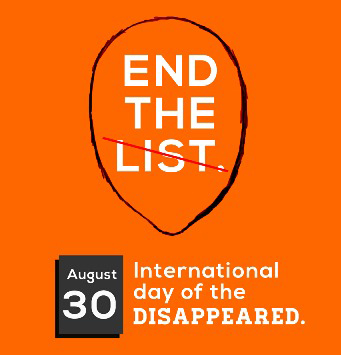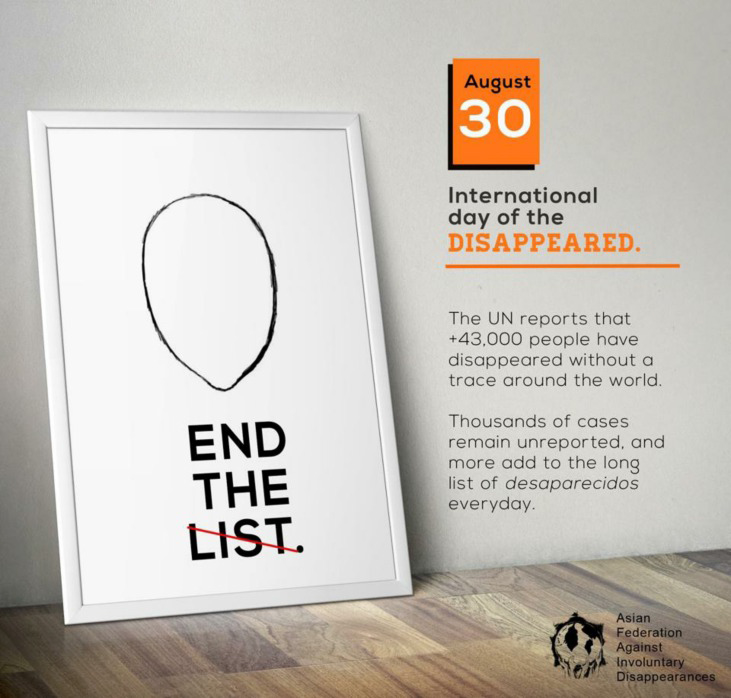
AFAD STATEMENT FOR THE 2014 INTERNATIONAL DAY OF THE DISAPPEARED
Asian peoples are the most victimized by the practice of enforced disappearance over the past years. The practice is still continuing with 14 Asian states out of 21 asked to respond to 93 new cases lodged at the UN
Working Group on Enforced or Involuntary Disappearances (UNWGEID), as contained in its August 4, 2014 report to the UN Human Rights Council. These Asian states are Bahrain, Bangladesh, Cambodia, India, Indonesia, Iraq, Nepal, Pakistan, Saudi Arabia, Syria, Tajikistan, Thailand, United Arab Emirates and Yemen.
Urgent appeals were also sent by the UNWGEID to 16 States, eight of these from Asia (Bahrain, Bangladesh, China, Iraq, Kazakhstan, the Lao People’s Democratic Republic, the Syrian Arab Republic and United Arab Emirates) concerning the whereabouts of persons who were arrested, detained or feared to have been disappeared or at risk of disappearance. Communications concerning allegations of harassments of human rights defenders and relatives of disappeared persons were also sent to 12 states, five of these are from Asia (Bangladesh, Nepal, Pakistan, Sri Lanka and Thailand).
Prominent human rights defenders who recently disappeared include Cao Shun-li, a lawyer from China who was fighting for public participation in the country’s Universal Periodic Review at the UN but was disappeared and later on reported to have died while in the hands of government authorities. She was denied medical treatment while in detention. (see http://www.theguardian.com/world/2014/mar/14/china-activist-cao-shunli-dies-human-rights). In Thailand, Pholachi “Billy” Rakchongcharoen, an environmental activist disappeared on 17 April 2014 and the habeas corpus petition filed by his wife on 24 April 2014 was dismissed by a local court for lack of evidence despite the testimonies of witnesses. (http://www.icj.org/thailand-disappearance-of-billy-demands-special-investigation/). In Lao, the government continues to deny involvement in the disappearance of Sombath Somphone, 2005 Ramon Magsaysay awardee for Community Leadership.
On this fourth year commemorating the UN–declared International Day of the Disappeared, the Asian Federation Against Involuntary Disappearance (AFAD) calls on Asian peoples to act now and be part of the movement to end the practice of enforced disappearance. The psychological, economic, social and political implications of enforced disappearance are not just confined to the immediate families of victims but permeate into the social fabric of their immediate communities and the whole of society. The above cited countries in Asia with recent cases of enforced disappearance are members of the United Nations and are therefore bound by the core international human rights instruments that obliged them to protect the human rights of its citizens.
Unlike in other regions of the world where regional mechanisms are already instituted, there is none yet in Asia. Families of Victims of Enforced Disappearance are putting their hope on the Convention Against Enforced Disappearance (CAED) as a legally-binding measure to address their quest for truth and justice but in Asia, only Iraq, Kazakhstan and Japan have so far ratified it.
Recent developments in the region further threaten the human rights gains in the past with countries like Sri Lanka and Bangladesh becoming more repressive with recent policies restricting the movement of human rights defenders and even controlling the funds of human rights organizations. Thailand is now under a military junta whose coup leader has recently been named Prime Minister and endorsed by the King.
(http://online.wsj.com/articles/thai-coup-leader-becomes-prime-minister-1408947091). India, which is supposedly the “largest democracy” in the world, continues to deny the demands of Kashmiri people for truth and accountability at least in the recently discovered unmarked and mass graves in Jammu and Kashmir. It continues to hinder the work of human rights activists, highlighted by the recent denial of entry to India of AFAD’s Secretary General, Mary Aileen Bacalso.
“Overcoming these obstacles to truth and justice and the overall movement towards a world without disappearance lie in the hands of Asian peoples”, Mugiyanto, Chairperson of AFAD said. “The people need to speak out, Say No to Enforced Disappearance, and Call on their States to Ratify the CAED in various platforms, individually or collectively, whatever is available to them. AFAD needs their support.,” he concluded.

